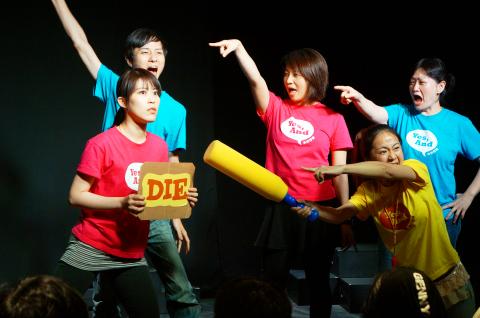Two opposing teams take the stage, ready to compete. A player from one team steps forward, seeking suggestions from the audience for a scene in which a death is involved.
“I hear mental hospital. I hear sex scene. Okay, I will take the mental hospital,” the player says, and proceeds, along with her team to create a 60-second show, which draws considerable laughter from the full-house audience. They won the round.
It was one of the several improvisational skits performed by actors from the Guts Improv Theater (勇氣即興劇場) last Friday at the company’s newly opened theater. This type of performance is called Theatersports, an invention of Keith Johnstone, a British pioneer of improvisational theater, which combines the format of a competition with theatrical performance.

Photo courtesy of Guts Improv Theater
There are several ground rules: no props and costume. Players need to make up stuff and create scenes spontaneously based on audience suggestions. There are also rules for each improvisational game. For example, one of the games played last Friday saw the players weaving together a story using disconnected lines suggested by the audience, including “come here, you,” “these problems are not real problems” and “under the banyan tree by the road.”
Like a sports game, audience engagement is also highly valued. Ways to participate include rating performances by clapping or yelling “die” to eliminate a stammering player from a game that involves members taking turn to compose a story by adding sentences.
“When I first encountered theatersports, I thought it was great fun and it challenged my theater experience. You see a group of actors on stage trying so hard to connect with those in the audience. It is spontaneous and amusing,” says Wu Hsiao-hsien (吳效賢), founder of Guts Improv Theater, which is a member of the International Theatersports Institute and holds a license to produce games of theatersports.
Setting up the company in 2004 shortly after returning to Taipei from her internship at BATS Improv, a center for improvisational theater based in San Francisco, Wu held workshops to teach improv skills before producing the troupe’s debut show in 2006. One reason is that improv theater is a little-known genre in Taiwan. Even trained actors need to learn the skills of improvisation.
“Given a prepared script, character and direction, an actor’s main responsibility is to act accordingly; on the other hand, as improvisers, our job is to act, direct and script at the same time. And we must create the characters, dialogue, action and the story collaboratively with other improvisers on stage,” Wu explains.
For Wu, improv is a form of theater that reflects life itself, unpredictable, ever-changing and without a script; its guiding principles can easily go beyond the circle of performing art and into everyday life.
“In Taiwan’s education, there is little emphasis on team work. We take tests and are taught that results are what matter. We don’t do well when it comes to helping each other out. At workshops, we use various improv games and training to emphasize processes during which failures are treated as new possibilities. It is about accepting, supporting and relying on each other. To me, it is a wonderful thing,” she says.
Apart from theatersports performance, the troupe also produces improvisational musicals as well as short-form and long-form works of improvisation. For those interested in learning improvisation, various types of workshops are on offer on a regular basis. More information can be obtained at the company‘s Web site at www.gutsimprov.com.

This is the year that the demographic crisis will begin to impact people’s lives. This will create pressures on treatment and hiring of foreigners. Regardless of whatever technological breakthroughs happen, the real value will come from digesting and productively applying existing technologies in new and creative ways. INTRODUCING BASIC SERVICES BREAKDOWNS At some point soon, we will begin to witness a breakdown in basic services. Initially, it will be limited and sporadic, but the frequency and newsworthiness of the incidents will only continue to accelerate dramatically in the coming years. Here in central Taiwan, many basic services are severely understaffed, and

Jan. 5 to Jan. 11 Of the more than 3,000km of sugar railway that once criss-crossed central and southern Taiwan, just 16.1km remain in operation today. By the time Dafydd Fell began photographing the network in earnest in 1994, it was already well past its heyday. The system had been significantly cut back, leaving behind abandoned stations, rusting rolling stock and crumbling facilities. This reduction continued during the five years of his documentation, adding urgency to his task. As passenger services had already ceased by then, Fell had to wait for the sugarcane harvest season each year, which typically ran from

It is a soulful folk song, filled with feeling and history: A love-stricken young man tells God about his hopes and dreams of happiness. Generations of Uighurs, the Turkic ethnic minority in China’s Xinjiang region, have played it at parties and weddings. But today, if they download it, play it or share it online, they risk ending up in prison. Besh pede, a popular Uighur folk ballad, is among dozens of Uighur-language songs that have been deemed “problematic” by Xinjiang authorities, according to a recording of a meeting held by police and other local officials in the historic city of Kashgar in

It’s a good thing that 2025 is over. Yes, I fully expect we will look back on the year with nostalgia, once we have experienced this year and 2027. Traditionally at New Years much discourse is devoted to discussing what happened the previous year. Let’s have a look at what didn’t happen. Many bad things did not happen. The People’s Republic of China (PRC) did not attack Taiwan. We didn’t have a massive, destructive earthquake or drought. We didn’t have a major human pandemic. No widespread unemployment or other destructive social events. Nothing serious was done about Taiwan’s swelling birth rate catastrophe.